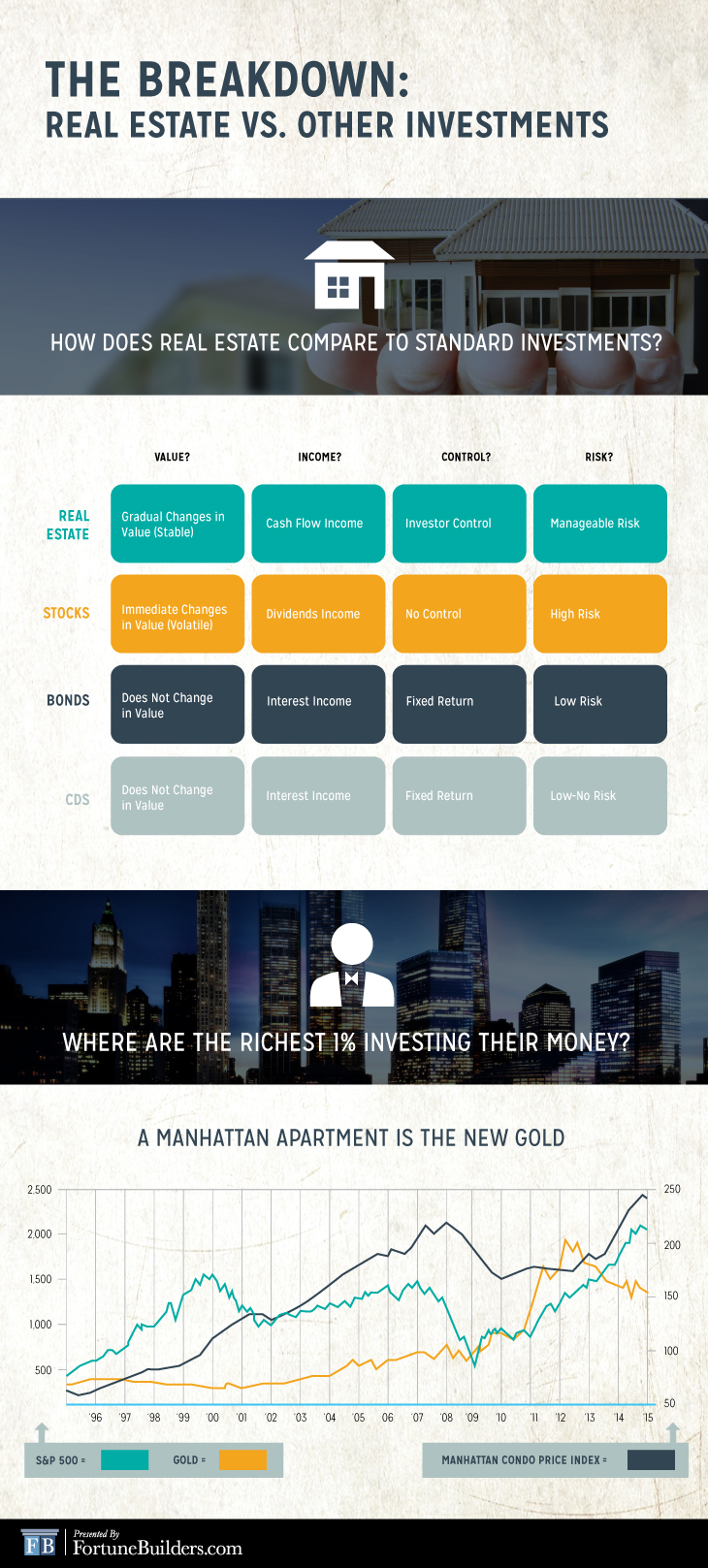It’s no secret that investing your money is a great way to grow long-term wealth. Once you have an emergency fund in place, it’s time to start tucking your savings into investments. Many investment options are available, so it can be tricky to pick the right ones for your investment goals. One major type of investment to consider is real estate. Is real estate a good investment? Keep reading to find out the answer.
Is Real Estate A Good Investment In 2022?
Real estate continues to prove itself as a great investment in 2022. To demonstrate, here are the numerous advantages associated with real estate investing:
-
Great Portfolio Diversification
-
Home Values Tend To Rise
-
You Can Invest Without Owning Property
-
Reliable Long-Term Investments
[ Thinking about investing in real estate? Register to attend a FREE online real estate class and learn how to get started investing in real estate. ]

1. Great Portfolio Diversification
Diversifying your portfolio is a great way to hedge against risk. For instance, let’s say you have all your investments in airline stocks. The industry takes a huge hit, and your net worth plummets. In contrast, let’s say that you spread your risk by investing in airline stocks, computer company stocks, and fitness technology stocks. Even if the airline industry were to experience a major downturn, the computer and fitness technology stocks likely would continue performing well.
Another way to diversify your portfolio is to invest your money in different asset categories altogether. Instead of just investing in stocks, you could also invest in renewable energy and real estate. By investing in different asset classes, you’ll likely be more protected when markets move as a whole. For instance, the real estate market typically moves independently of the stock market. Even if the stock market were to experience some volatility, your portfolio could continue performing relatively well due to the steady growth of your real estate investments.
2. Home Values Tend To Rise
Of course, real estate investing is not free of risk. Any type of investment comes with some level of risk, and due diligence is a large part of mitigating it. According to CNBC, U.S. home prices increased 48.55 percent over the last decade. Despite temporary ebbs and flows in the market, home values have risen over time.
3. You Can Invest Without Owning Property
Real estate investing is often associated with the concept of owning property, whether it be as a landlord who rents out their investment property or as someone who flips houses.
However, you don’t necessarily have to buy or own property to invest in real estate. For instance, you could put your money in a REIT (Real Estate Investment Trust). We will explain how REITs work shortly.
4. Reliable Long-Term Investments
Real estate lends itself as a reliable long-term investment, and you could earn some significant wealth if you expand your real estate portfolio over time. You could own several passive income properties, or double down on your REIT investments. Regardless of which avenue you choose, real estate can provide you with significant rewards over the long haul.
What’s The Average Annual ROI For Real Estate?
According to the S&P 500 Index, the median return on investment (ROI) in the U.S. real estate market is 8.6 percent. This number represents the housing market as a whole, while various sectors within the market can perform differently from one another.
Because investors often specialize in different areas of real estate, it’s more informative to highlight the performance of different sectors within the industry:
-
Residential real estate: 10.5%
-
Commercial real estate: 9.5%
-
REITs: 11.8%
Single-Family Real Estate Investments
Many Americans are real estate investors without really knowing it. When they purchase their first single-family home, they are already on the road to growing wealth. Owner-occupied homes generally appreciate in value over time. Location, upkeep, and weather are all examples of elements that can influence your rate of return.
-
If you’re looking for the highest ROI, look to Utah. Single-family homes in this state offer the highest returns over the short- and long-term.
-
Other states offering high ROIs include Colorado, Idaho, and Montana.
-
If you live in Connecticut, you, unfortunately, experience one of the nation’s lowest ROIs. However, the District of Columbia experienced the nation’s lowest 1-year return and the only area to experience loss between Q3 and Q4 in 2021.
-
In just the fourth quarter of 2021, the average annual ROI across states was 17 percent.
REITs
Earlier, we introduced REITs as a method of investing in real estate without owning physical property. REIT stands for “real estate investment trust” and is similar to a mutual fund. Instead of stocks, the trust invests in commercial real estate.
REITs can allow you to diversify your portfolio to include real estate without buying property. Further, commercial real estate is expensive, and as a solo investor, you could expect to spend millions or even billions of dollars to buy commercial property. By investing in a REIT, you can enjoy the returns earned by commercial real estate without having to put in so much money. The minimum investment to join a REIT is in the ballpark of $1,000 to a few thousand dollars.
Residential Real Estate
If you would like to invest in physical property in addition to your personal residence, residential real estate is often the place to start. This type of investment is typically more conservative relative to multi-family or commercial real estate. Thus, the risk is lower while still offering fair and consistent returns. Here, you have the option of converting your investment into a long-term rental or short-term or vacation rental (explored next.) The average annual return for single-family homes is 10.5 percent. Suburban homes tend to perform better than urban homes.
Short-Term Rentals
Historically, short-term rentals such as vacation homes or homes listed on Airbnb rent for higher prices than long-term rentals. However, you must account for the costs associated with running a short-term rental. There is a higher turnover rate and thus additional wear and tear. You’ll need to account for higher operating costs, including more frequent repairs, maintenance, cleaning, marketing, and advertising.
Here are some fun facts about short-term rentals:
-
Airbnb listings rent for an average of $185 per night.
-
You must account for your vacancy rate, as occupancy is 48% on average.
-
If you successfully achieve 100% occupancy, you might earn an average of $5,735 in rental income per month.
-
The majority of travelers prefer to vacation close to water, and specifically, the beach.
-
Investors are confident that vacation rentals will be lucrative following the pandemic. Travelers prefer the privacy and touchless technology offered by vacation rentals over hotels.
Apartment Rentals
Although short-term rentals have the potential for greater cash flow, some investors prefer long-term rentals. For instance, they can be more cost-effective in the long run due to predictability and lower vacancy rates.
-
The total net annual return for an average U.S. apartment is $8,190.
-
If you have a garden or low-rise apartment the ROI is even better at $13,370.
-
After expenses, rental income nets at an average of $9,976.70 each year.
-
Some costs have increased over time. For instance, insurance costs increased 19 percent in 2020, while operating expenses increased 2.6 percent.
-
The average rental rate for a 2-bedroom apartment is $1,543 per month or $18,516 per year.
Breakdown Of Real Estate Vs. Other Investments
While stocks, bonds, certificates of deposit, and other forms of investment each hold water in their own unique way, real estate offers something that others can’t: cash flow that is directly correlated to your own decisions. In other words, your actions are responsible for your net income. Other forms of investment often rely exclusively on decisions made by company officers. Real estate investors are in charge of their own assets, and there is a lot to be said for that. Here is a visual breakdown of real estate vs. other investments for investors who want to diversify their portfolios:
Real Estate Vs. Stocks
Historically, stocks tend to increase both profits and cash dividends over time. Investors, therefore, have the chance to earn increased profits from stocks annually if the company proves profitable enough. Investing in stocks also provides the chance to create a diverse portfolio. By investing in mutual funds, investors can buy stock in multiple companies at a time, which enables them to spread out their investment capital and lessen the overall amount of risk they take on.
While the benefits of investing in stocks are hard to ignore, there are a few trade-offs involved. The most obvious dilemma for investors is that stocks are unpredictable. Due to market volatility, the price of stocks can fluctuate dramatically in a given period. For some investors, watching their profits grow and shrink rapidly throughout the year can be frustrating. In comparison, real estate represents a more stable investment opportunity for investors unwilling to participate in the risky nature of the stock market.
A final thought when considering the stock market vs. real estate is the amount of knowledge required to get started. The average person is unfamiliar with the inner workings of the stock market, and while that is perfectly acceptable, it can act as a barrier to entry. Many investors will find themselves at the hands of stock brokers or financial advisors. For those who prefer to have more control over their portfolio, stocks can represent a challenge.
Real Estate Vs. Bonds
There are three main categories of bonds investors can work with: corporate, municipal, and government bonds. Investors earn revenue from bonds through interest as they come to maturity. One of the biggest perks of investing in bonds is that they are low risk. While interest rates can fluctuate, bonds are often considered more reliable than other investment opportunities.
Despite their low-risk nature, investors may find bonds do not offer the same profitability when compared to other investments. In many cases, the returns will be significantly impacted by the rate of inflation. For example, if you are earning three percent and the inflation rate is one percent, your returns will have dropped by one-third. On the other hand, real estate typically benefits during times of inflation. As material and labor costs go up, rent traditionally follows suit, leading real estate investors to realize higher profits during these times.
Another important factor to consider when looking at bonds is that many are not taxed at the federal level, and entrepreneurs will be hard pressed to find tax breaks when investing. Depending on the time frame, investors may be subject to income and capital gains taxes on any interest earned. In comparison, real estate investors stand to benefit from a number of tax deductions.
While bonds present a straightforward, relatively low-risk investment opportunity, they may not offer the best returns compared to real estate. Across the board, rental properties typically outperform bonds because of their overall ability to generate cash flow, even during times of inflation or low-interest rates. However, just because there are disparities in the profit potential does not mean investors should entirely rule out this option. For investors seeking to diversify an existing portfolio, bonds can provide a stable opportunity to do just that.
Real Estate Vs. CDs
Certificates of Deposits (CDs) can provide investors with yet another low-risk investment opportunity, though they also have generally lower profit margins when compared to real estate. The profit potential of CDs is directly impacted by interest rates. When interest rates are low, investors will have trouble yielding a high return on investment. Additionally, CDs will be taxed similarly to bonds, and investors will struggle to find as many tax deductions as real estate.
What makes CDs attractive to many is the opportunity to expand their portfolio, though investors must be patient to see the returns. CDs can take anywhere from five to ten years to come to maturity, and investors cannot access their funds during that time. Real estate represents more liquidity in comparison; even if investors are unable to sell a given property, there are a number of ways they can tap into the existing equity. For those asking “should I invest in real estate or another investment,” CDs can still represent the chance to diversify and grow your finances over time, despite their lower profit margins.
Real Estate Vs. REITs
Real Estate Investment Trusts (REITs) allow investors to buy shares in real estate companies and are often thought of as a great first step into the world of real estate. There are several key differences between investing in REITs and in physical real estate, with the most obvious being property ownership. REITs see investors operating in the real estate industry without ever owning physical properties, and this has a number of effects on the potential profits.
REITs will often have annual dividends between two and three percent, and sometimes less. Owning properties, on the other hand, can lead to higher dividends and more equity. This is due to the fact that REITs often focus on markets with relatively low yields in an effort to reduce risk. REITs will also pay dividends that are deemed sustainable by the company.
When investing directly in real estate, investors stand to benefit from the opportunity of managing a property directly and having a more active role in the business operations. Investors who work with physical real estate can choose which market they are operating in and will benefit directly as profits rise over time. While REITs can generate capital gains over time, investment properties offer the chance to receive profits and build equity in a physical asset. This difference can enable real estate investors to expand their portfolios at a quicker rate when compared to REIT investing.
Real Estate Vs. Gold
Investing in gold is a simple process that works like this: Investors buy the precious metal and earn a profit only after selling it (once the gold has appreciated in value). While this process sounds straightforward, it is truly a waiting game, especially when compared to real estate investing. Real estate allows the opportunity to earn revenue while waiting on an asset to appreciate in value, resulting in more cash flow overall.
As you examine real estate vs. other investment returns, gold may not be the first thought that comes to mind. It is often not the most profitable or popular investment opportunity. There is something to be said about investing in gold; although, investors looking for an asset to focus on may not find the returns they are hoping for by purchasing gold.

Summary
Is real estate a good investment? Your investment portfolio is often a representation of your investor personality and financial objectives. Real estate has proven itself a worthy investment that provides cash flow and appreciation over time. Whether you’re an aggressive or conservative investor, it’s a great way to diversify your portfolio and can pay off in the short-term and long-term. Further, real estate as a category is unique. It offers a diverse array of investing opportunities, meaning there is something for everyone. Even if you don’t necessarily want to own property, you can still invest in real estate.
Ready to start taking advantage of the current opportunities in the real estate market?
Click the banner below to take a 90-minute online training class and get started learning how to invest in today’s real estate market!



